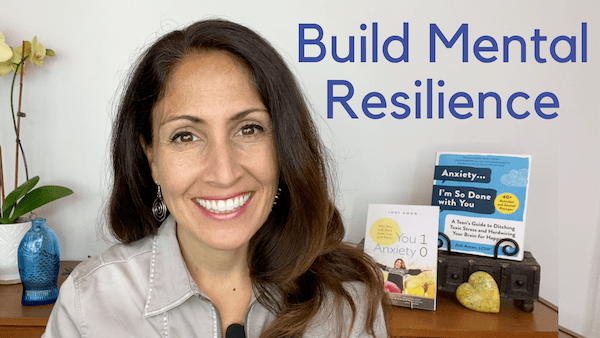What is this whole “mental resilience” thing? Do you need it? Do you have it? How do you know you have it? And, perhaps most importantly: Can you cultivate it? If so, how do you do that?
Let’s start with why we need resilience. We see so many people suffering daily; friends, family, and strangers around the world are all dealing with not only the pandemic but blatant racism, back-to-school pressures, isolation, and other stressors so numerous that we feel overcome. We need to find our empowered problem solver within.

Are you feeling overwhelmed by events in the world? You’re probably raising your hand right now if you are a sensitive soul. This “overwhelmed” might trick you into thinking that you are weak and lack resilience because you feel all the feels. And…they feel pretty darn huge.
However, in this blog and video, I will show you how being sensitive means you are open and evolved, which makes you primed for a more robust mental resilience than others who seem unaffected by current events. In them, I’ll help you see the difference between resilience and denial.
And I’ll invite you to compassion and empowerment instead of fear and power struggle.
Building Mental Resilience with Compassion
When you’re an empathic person, you feel your feelings plus the feelings of people around you. With all this negativity in our world, sensitive people feel like crap, especially right now. The heaviness of feeling all of this negativity may seem like a curse or may make you believe that there is something wrong with you. However, fear not! Nothing is wrong with you. These sensations mean you have abilities that can make you feel better and even help those around you feel better. Luckily, you can hone these skills to take blessings from being an empath without the curse.
Take compassion, for example. Without it, fear reigns. Compassion helps you decide to take actions that help other people. These actions build empowerment and hardiness rather than victimhood. In addition, you feel a sense of belonging, not isolation.
Without compassion, our victimhood stares us in the face. You feel trapped in it, helpless, which incites fear and urges people to want to grab their power back, even if it means oppressing others. This creates conflict and division in our families and communities.

Many sensitive people are caught between having compassion for others and not for themselves. But this is not why you feel so badly; it is because you feel so badly. Let’s fix that, shall we?
How to build robust mental resilience
Also, a recent weekly Live Coaching Session (that I give EVERY Monday at 11 am E on my Facebook page and YouTube channel) covered this very topic: What does Emotional Resilience Look Like?
Resilience helps you bounce back, carry on, and have tenacity even in the face of adversity and confusion. You still feel feelings, but you know how to process them, use them to take action, and release what is not yours to hold. Instead, you learn what you need to know and let them return to the field where they won’t affect you any longer.
Mental resilience allows you to be your true, authentic, fabulous self even in the face of so much upheaval and change in the world around you.

How to Build Mental Resilience
1. Have self-compassion, and don’t judge yourself.
Mental resiliency gives us the strength and energy to find motivation. Remember, you still feel, but with the addition of self-compassion, you are softer with yourself.
2. Create a life within limits.
Life has restrictions. You can choose to see all of them and feel like a victim, trapped and out of control. Or…you can remember there have always been restrictions and limits in this life, and you have full agency to use your power within them instead of lamenting them. You will feel so much better. Establish what you can control and focus on there.
3. Embrace your empowered problem-solver self.
You have evolved to solve problems. Seeing yourself as able instead of unable will help you be kinder, more loving, and more understanding. In addition, you will feel better about yourself and less vulnerable in the world.
4. Incorporate daily resilience-building practices.
Make time for resilience-building practices like having a routine, engaging in challenging work, playing, exercising, eating healthy, and getting enough sleep. Make sure your day has meaning and a strong sense of purpose. Engage in novelty weekly to stimulate your brain and bring vitality in. And, definitely continue to build and burnish your community.
I hope you add my Live coaching calls to your calendar! Mondays 11 am E. Right here. Like/follow my page and hit the bell to be notified! Bring your questions and pondering about your life, relationships, and career. If you feel “gotten” by this post and video, I’m here for you; consider deep-dive psychospiritual healing with me.
Being compassionate with myself is something I have only learned recently, and I wish it had happened earlier. I have realized that if I keep judging myself in my endeavor to improve and evolve, I will head nowhere.